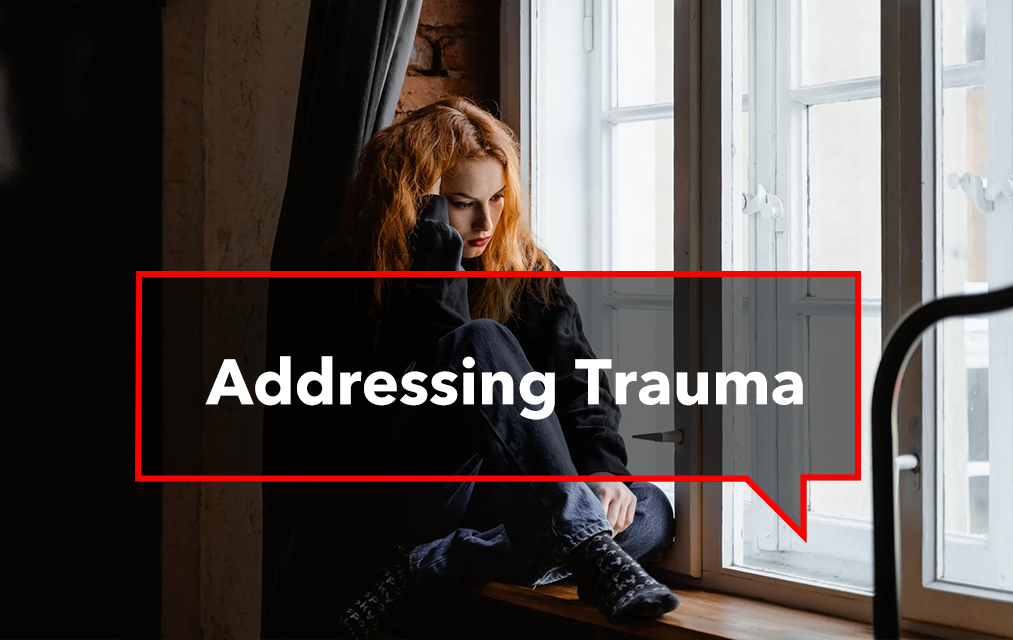Addressing Trauma

It’s okay not to be okay. It’s possible to be affected by trauma even if you haven’t experienced something you would define as traumatic. Trauma can be challenging to identify. It’s important to remember that trauma can take many forms and doesn’t always result from a physical event. Recognize your feelings and seek help when needed. Seeking help is a sign of strength, so don’t be afraid to reach out for support.
This blog will explore the links between trauma and mental health and how you can recognize when you might need help.
What is Trauma?
Trauma can be defined as an experience that has long-term psychological or physical effects. It could result from a single overwhelming event, such as experiencing violence or witnessing an accident. It may also result from several events, such as growing up in an abusive home or living through a natural disaster.
In some cases, trauma can even manifest without any apparent source or explanation. Regardless of the cause, it’s important to recognize that trauma affects everyone differently and can have lasting physical and mental health implications.
The Impact of Trauma on Mental Health
The impact of trauma on mental health can vary significantly from person to person. However, it’s often associated with anxiety, depression, and other mental health disorders. People who have experienced trauma may also struggle with issues such as substance abuse and difficulty forming relationships. In extreme cases, the effects of trauma can even lead to self-harm and suicidal thoughts or actions.
What Are Common Reactions to Trauma?
Trauma can commonly cause stress reactions. After a horrific experience, people frequently claim that their initial emotion is a relief at still being alive. Worry, anxiety, and fury are also common emotional responses. People who have experienced trauma may also find it difficult to stop thinking about what occurred. Arousal, sometimes known as becoming vigilant or “on guard,” can be increased by traumatic situations, making people more sensitive to the noises and sights around them.
Understanding what happens when you or someone you know responds to a stressful experience can help you experience less fear and manage these situations in a healthier way. Even those trained to handle crises, such as members of the armed forces or emergency assistance and rescue personnel, may experience outbursts from time to time.
It’s important to remember that everyone responds differently to trauma and requires different types of support. Some typical responses to trauma include the following.
● Loss of future optimism
● Feeling “remote” or having less regard for other people
● Being incapable of focusing or making decisions
● Feeling jittery and easily shocked by loud noises
● Having a constant sense of alertness and caution
● Having disturbing dreams and recollections
● Experiencing issues at work or school
● Avoiding people, things, or locations connected to the incident
Recognizing When You Need Help
We should pay attention to both our physical and mental well-being. Feeling tired, having a headache, or feeling sore once in a while is normal. But if these feelings are more frequent or make it difficult to go about your daily life, then it may be time to check in with yourself.
Mental health is just as important as physical health. There are days when we don’t feel like ourselves, which is okay. But if the feeling persists and starts to affect how we think, feel, and act, it may signify something more serious.
If this happens, try talking with a friend or family member or reaching out for professional help. Remember that you are never alone in this journey and that there are always people who care about you and want to help.
People who have experienced traumatic events should know when it’s time to seek professional help for their mental health concerns, especially when you or they experience the symptoms mentioned above. It would be best if you reached out for help from a trusted friend, family member, counselor, therapist, or doctor – anyone who will listen and take your concerns seriously.

Securing a Healthier Future
Trauma has far-reaching effects on both mental and physical health, some of which may not be immediately apparent until long after the initial traumatic event has occurred. If left untreated, these symptoms can worsen over time and lead to more serious issues, such as depression or post-traumatic stress disorder (PTSD).
It is important for those who have experienced physical or emotional trauma to recognize when they need help to begin the journey toward healing and recovery. There are many ways to address trauma, from talking with a trusted friend or family member to seeking professional counseling. Seeking help will make all the difference in returning to a healthy life again!
For more information, contact us, and let’s create awareness of mental health together!

